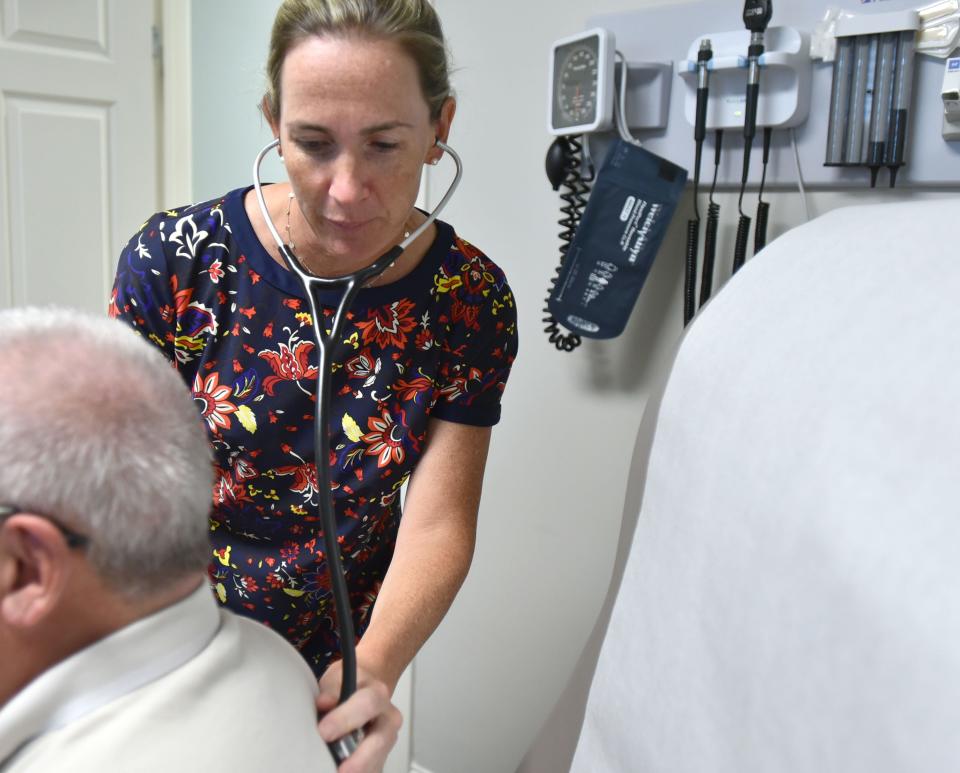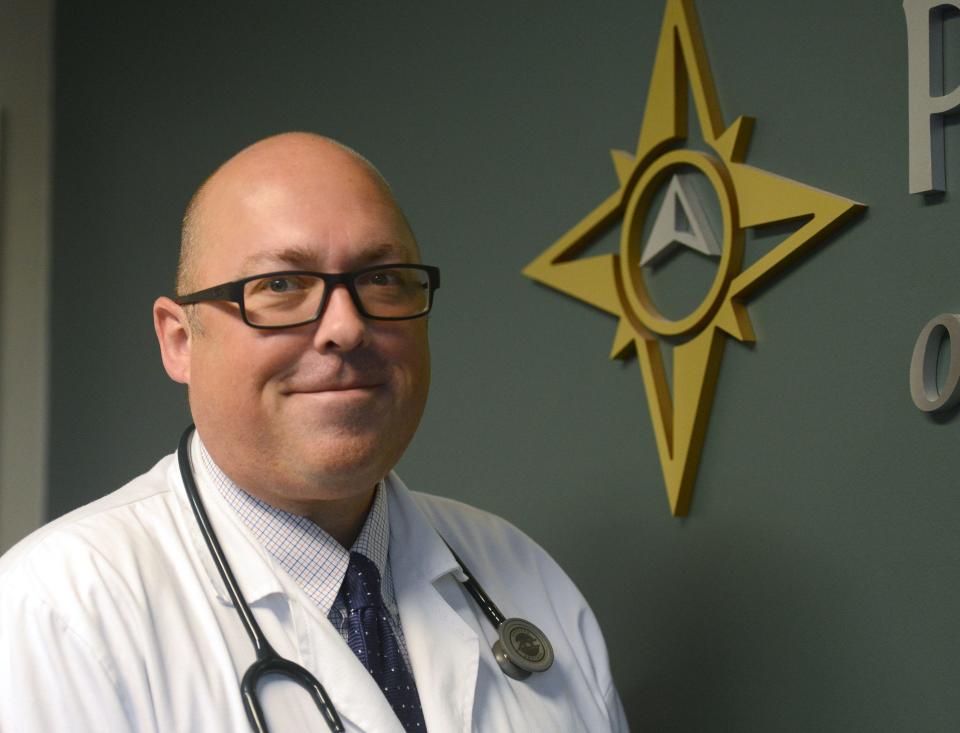Health care costs are skyrocketing. Two Cape Cod doctors are trying a new way.
HYANNIS — Dr. Daniel Arnold has been working as a primary care physician on Cape Cod since 2009 and opened his own primary care practice in 2018. Over the years, he noticed frustrations and burnout issues from both the physician and the patient side.
Amid skyrocketing health care costs, Arnold decided to transition his practice into a different model of primary care called direct primary care.
Arnold, along with Dr. Anne Marie Kelly, are the first two physicians on Cape Cod to start this model. Both Arnold and Kelly are licensed in Massachusetts with a specialty in internal medicine, according to state records.
Direct primary care, or DPC, is an alternative payment model, with a membership fee and no fee-for-service payments.

According to the Direct Primary Care Coalition, since 2009, almost 1,200 new direct primary care practices have emerged across the country.
“Physicians and basically the entire health care profession has given up control over itself to insurance companies, the government, and corporations for the last 60 years,” said Arnold.
According to him, the direct primary care model helps physicians focus more on the patient rather than billing hours.
“This model was born out of necessity, because the current reimbursement system is not sustainable anymore,” said Kelly. “It's not sustainable psychologically for the well-being of both the patient and the physician. I want my patients to be happy, and I want them to feel like they're getting well cared for and that means privacy, continuity and someone who will listen.”
How does direct primary care work?
The direct primary care model is an alternative to fee-for-service insurance billing, typically by charging patients a monthly, quarterly or annual fee. This fee covers all or most primary care services including clinical services, laboratory services and consultations.
With direct primary care, patients don’t pay monthly health insurance premiums or copays. Instead, it’s a monthly or annual fee system with a primary health care provider. Providers do not accept insurance or participate in government programs, relying solely on patient fees.
In a traditional primary care practice, doctors are compensated based on how they code and the quantity of patients they see, rather than the quality of care that they provide, according to Arnold. Established direct primary care practices average 800 to 1,000 patients while a comparable insurance-dependent practice averages 2,500 to 4,000, according to the American Association of Retired Persons.
The American Academy of Family Physicians' official position on direct primary care is that it “supports the physician and patient choice to, respectively, provide and receive health care in any ethical health care delivery system model, including the DPC practice setting.”
The practice started in April
Arnold started practicing the direct primary care model on Cape Cod in April. At his practice, Veritas Direct Care in Hyannis —previously known as Primary Care of Cape Cod ― each patient has a designated provider who they will have direct communication with at all times.
At Veritas Direct Care, patients have access to a physician of their choice, and physicians are accountable first and foremost to their patients, according to Arnold. The number of visits or consultation with the provider doesn’t have any limits, though it may vary from clinic to clinic.

“The problem is if you're in the insurance model you don't work for the patient, you work for the insurance company who pays you,” said Arnold. “In the current insurance model, Medicare model or the government health care model, physicians are supposed to spend less than seven minutes per patient and that's just not appropriate.”
The direct primary care model takes down these barriers by focusing solely on the relationship between a health care provider and a patient.
Spending more time with patients
Physicians working in a direct primary care practice are able to spend additional time with patients. Patients have easier access to appointment times that meet scheduling needs. Patients are guaranteed to see their doctor, not another provider. Patients are able to reach out to their doctor via email and cellphone, in times of urgent consultation, according to direct primary care proponents.
In Salem, a direct primary care practice has been in place since 2015
“We've used insurance as a form of payment rather than actual insurance for decades,” said Jeff Gold, a primary care physician and founder of Gold Direct Care, a direct primary care practice in Salem. Gold has been operating his clinic following the direct primary care model since 2015.
“Using an insurance card to pay for a $5 blood test makes no sense for anyone but that's what we've been doing for decades and now we’re seeing all the cost shifting on to patients with deductibles and higher co-pays,” said Gold.
“We want people to know that there's an option of getting affordable, accessible and transparent quality care where they can come in, even for 45 minutes and just share their health concerns,” said Gold.
According to Gold, there's clearly a demand for an alternative model but people don't know that this option exists.
The biggest misconception for the direct primary care model is getting it confused with the concierge model. Concierge practices continue to bill patient’s insurance companies for covered services in addition to the membership fee, while a direct primary care practice charges only the membership fee and includes all services.
Patients still need to keep their insurance plans
According to Gold, an insurance policy is necessary for emergencies, chronic illnesses and more complicated health care procedures.
Generally, patients should still retain an insurance policy for more specialized and complex treatments. Patients under the direct primary care model should choose a high deductible insurance plan with a lower monthly premium because there are discounted laboratory tests done on site. Reduced imaging fees at outside sites are offered, in some clinics.
With the direct primary care model, physicians still accept patients that are on Medicare or other insurance policies; however, they do not bill these insurance policies. Insurance will still cover any laboratory testing, imaging, medications, referrals to specialists and hospitalization.
“I want to provide a reasonable fee and I don't want to work for insurance companies,” said Kelly. “I think medical insurance is much needed and it's an excellent system, but the way it’s been shaped is not right.”
“I no longer work for Medicare, I can still use a patient's Medicare, can order a test through Medicare or refer to another Medicare physician if needed, but I don't bill Medicare or any other insurance companies anymore,” said Arnold. “It’s the patients who are directly paying us.”
Awareness and education about these alternative models are crucial for patients to make informed decisions
“People need to know that there are other options available. I would suggest patients read more about the DPC model, ask questions to your providers or directly talk to the physicians who are providing this model to know more,” said Gold.
In the current health care system, physicians are not happy and they are leaving the Cape, said Kelly.
“My patients are witnessing these shifts among doctors and so far they have been supportive about me adopting this model,” she said.
Kelly will remain in the insurance-based model through the end of the year and start the direct primary care model in January.
“So far we're getting great feedback from patients and the job satisfaction amongst our providers and nurses here is improving,” said Arnold. “I would love to spread this model around Cape Cod, as there is an increasing number of frustrated physicians that are moving away, or going into early retirement.”
“Most of my patients have been very supportive,” said Kelly. “And even the ones that are not ready to sign up with this model, they have wished me well in this new transition.”
Rasheek Tabassum Mujib writes about health care and education. Reach her at rmujib@capecodonline.com.
Thanks to our subscribers, who help make this coverage possible. If you are not a subscriber, please consider supporting quality local journalism with a Cape Cod Times subscription. Here are our subscription plans.
This article originally appeared on Cape Cod Times: Direct primary care practice opens on Cape Cod, sidestepping insurance

